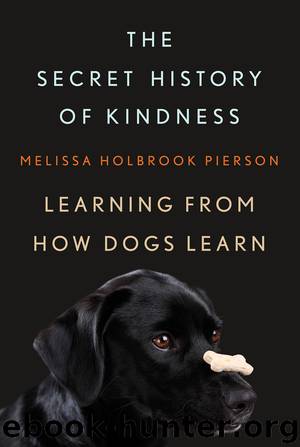The Secret History of Kindness by Melissa Holbrook Pierson

Author:Melissa Holbrook Pierson
Language: eng
Format: epub
Publisher: W. W. Norton & Company
Published: 2015-11-22T16:00:00+00:00
* * *
* In the zoo, we draw a frame around existence. In that way, it becomes ours, and diminished to possessible size. The animal’s sole value is reduced to spectacle. What is truly experienced by the subject remains invisible.
† There is no one who holds faster to animal rights than I do; I am farther left than your average ecoterrorist (on paper, anyway). Rights are exactly that: They are not granted by anyone—they are already held by individuals by right of birth. We can decide only to deny others their rights. Animals have all the same rights we do as sentient beings.
In the case of captive carnivores, the food we provide them in lieu of live prey must by default be factory-farmed carcasses. The animal-rights activists who prevent live feeding thus contribute to a far greater evil. But none of it makes any sense anyway.
‡ A study published in the journal Nature (October 2, 2003, 425, 473–474) by researchers Ros Clubb and Georgia Mason, of the Animal Behaviour Research Group, Department of Zoology, University of Oxford, presented their findings on the cause of these neurotic behaviors in captive wide-ranging carnivores: not primarily that they were prevented from hunting but rather that they were deprived of the ability to roam. Therefore, unless more space could be given in zoos to species such as Asian elephants and polar bears, the researchers’ recommendation was that they no longer be held. The unfortunate fact is that it is exactly this sort of animal—the “cute,” powerful, or amazing ones—that is most popular with visitors. Such a recommendation, even from the highest authority, is not likely ever to be taken. Animals are kept in zoos not for their welfare, but for that of the zoo.
§ The cliché offered by parents to weeping children is apparently truer than we know: We learn from our mistakes. Our brains pay more attention for a longer period of time to outcomes of mistaken prediction than correct ones. We absorb more information when we screw up. (“Predictive Learning, Prediction Errors, and Attention: Evidence from Event-Related Potentials and Eye Tracking,” Journal of Cognitive Neuroscience 19, no. 5 [July 2007]).
¶ “Clicker is quicker” is one of the taglines of the methodology, and the impressive speed with which behavior can be taught using a bridging stimulus is on view everywhere the training is.
# Another one, from a momentary vacation to Googleworld, the all-inclusive resort that offers the weary writer all the procrastination she can eat: Hey, cool, an excerpt from a newly released book on dogs! It detailed some new findings about dog vocalizing, which is apparently more complex and variable than previously thought. One of the first comments under the piece read: “Finally puts the lie to that old behaviorism crap once and for all, as it should!” The research had no relation to behaviorism whatsoever.
** Thanks to the burgeoning growth in the field of cognitive ethology, animals’ creativity is being tested in all sorts of, yes, novel ways. Scientists are putting
Download
This site does not store any files on its server. We only index and link to content provided by other sites. Please contact the content providers to delete copyright contents if any and email us, we'll remove relevant links or contents immediately.
| Behaviorism | Cognitive Behavioral Therapy |
| Existential | Gestalt |
| Humanistic | Jungian |
| Psychoanalysis | Transpersonal |
The Art of Thinking Clearly by Rolf Dobelli(8841)
The 5 Love Languages: The Secret to Love That Lasts by Gary Chapman(8494)
Mindhunter: Inside the FBI's Elite Serial Crime Unit by John E. Douglas & Mark Olshaker(7834)
Becoming Supernatural by Dr. Joe Dispenza(7105)
The Road Less Traveled by M. Scott Peck(6634)
Nudge - Improving Decisions about Health, Wealth, and Happiness by Thaler Sunstein(6633)
Enlightenment Now: The Case for Reason, Science, Humanism, and Progress by Steven Pinker(6405)
Win Bigly by Scott Adams(6311)
Mastermind: How to Think Like Sherlock Holmes by Maria Konnikova(6235)
The Way of Zen by Alan W. Watts(5799)
Factfulness: Ten Reasons We're Wrong About the World – and Why Things Are Better Than You Think by Hans Rosling(4021)
The State of Affairs by Esther Perel(3926)
Gerald's Game by Stephen King(3918)
Man's Search for Meaning by Viktor Frankl(3631)
The Confidence Code by Katty Kay(3566)
Thinking in Bets by Annie Duke(3531)
The Worm at the Core by Sheldon Solomon(2917)
Enlightenment Now by Steven Pinker(2917)
Liar's Poker by Michael Lewis(2811)
